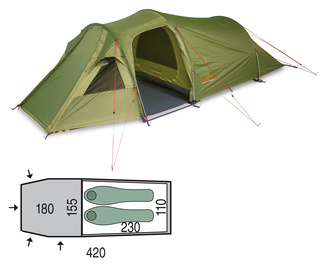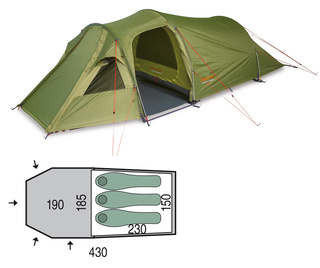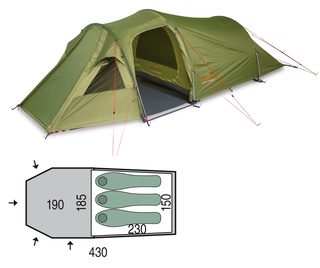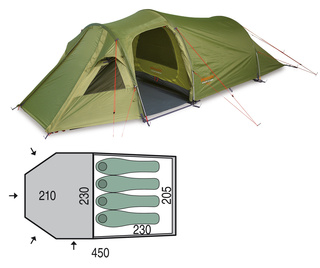Storm 2
Main advantages
Used materials
The fiberglass rods are made with a new technology that achieves lower segment weight with increased resistance to breakage.
Lightweight and solid polyester flysheet fabric has high resistance to UV, does not age and retains its properties during prolonged exposure to sunlight and heat
PU coating
It is a thin waterproof polyurethane layer applied several times on the inside of the tropic.Depending on the number of layers of coating, the tropic is resistant to water pressure up to 4000mm (Extreme and Hiking series), 3000mm (Trekking and Family series) and 2500mm (Outdoor series). The coating retains its elasticity even at very low temperatures well below freezing.
Detailed Description
Storm 2
A very spacious tunnel-type tent, suitable even for worse weather conditions, thanks to its low profile.
The tunnel construction guarantees very good use of the internal space.
Rain fly is made of Polyester with a polyurethane coating, guaranteeing a water column of 4,000 mm. The seams are taped with waterproof tape.
The floor is made of Nylon with a Polyurethane coating, providing a 10,000mm water column.
The rods consist of laminate segments with a diameter of 9.5 mm.

Technical specification
| features: | |
| Weight | 4.05 kg |
| Weight without inner tent | 2.9 kg |
| Package Size | ⌀18 x 45 cm |
| Number of people | 1 - 2 |
| Amount of enterances | 2 |
| Construction type | Tunnel |
| Amount of vents | 3 |
| Number of poles / crossing points | 3 / 0 |
| Buildable without a bedroom | Yes |
| Height of tent (bedroom) | 100 (90) cm |
| Siliconised | No |
| Taped seams | Yes |
| Number of pins | 17 |
| Category | Trekking |
| Material | |
| Material of poles | Fiberglass |
| Pole diameter | 8.5 mm |
| Flysheet material | Polyester, PU coating 4 000mm H2O |
| Groundsheet material | Nylon, PU coating 10 000mm H2O |

Description
The double-shell tent consists of an inner tent and an outer shell – rain fly. The entrance to the inner tent is on the front side, the outer tent has a large vestibule, suitable for storing luggage, cooking, etc., which can be entered through the front or side entrance.
Concept
The tent is based on the principle where the rod structure is strung in the sleeves outside the rain fly. The tent and the inner tent (which is hung under the rain fly) are erected at the same time after threading the tent poles through the sleeves. The advantages of this method are:
- tent construction is very fast
- if we set up in the rain, the inner tent will not get wet
- the inner tent can be detached from the rain fly and the rain fly can then be erected separately, resulting in a single-shell tent without a floor.
Ventilation
It is secured by three ventilation windows, which are located at the front entrance and in the rear part of the rain fly. The roof of the ventilation window is shaped in such a way that it is not folded by the wind. This prevents leakage even during rain with strong wind.
Building a tent
Put the tent poles of the structure through the sleeves and insert the steel spikes into the tubes at the end of the tent poles, which are threaded on the loops of the lower edge of the rain fly. We fasten the inner tent to the loops on the inside of the rain fly. The tent is not self-supporting, it must be anchored with at least a minimum number of pegs, or disconnect cords. Finally, we close the rain fly with plastic clips at the bottom edge of the tent.






